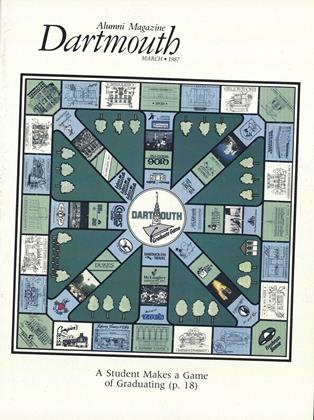Shallow Pride
Why all these letters saying alumni want to feel proud of Dartmouth again? Whatever made them stop feeling truly proud? A scuffle over the football coach? A confrontation between politically minded student groups? A series of disagreements between faculty and administration? If issues such as these can so completely undermine one's commitment to a fine educational institution, then the commitment was at best a shallow or misguided one.
The situation worsens when alumni withdraw financial support over such issues as though their dollars give them voting rights to determine how everyone in Hanover should behave. I do not send a list of "how-to-run-the-College" instructions with my annual Alumni Fund check. Nor, however, am I happy about everything that has occurred in Hanover over the last decade. But I am still proud of Dartmouth, and I still feel lucky to have received an education there. And I would like to think that all the alumni who have stopped casting their financial "votes" still feel lucky too and will unlock their checkbooks long enough to realize that Dartmouth has never stopped deserving their support.
Sandy Hook, Connecticut
Racist Wheelock?
On behalf of Eleazar Wheelock and American Blacks, I would like to clarify Professor Raymond L. Hall's essay, "A Reaffirmation of Mission," in the November issue. Mr. Hall evidently believes that the historic Christian position includes a proposition that "ministers [such as Eleazar Wheelock] . . . accepted . . . that blacks occupied the bottom of the Chain of Being. . . and slavery therefore did not violate the will of the Divine Creator."
Mr. Hall's sociological assessment of the roots of Dartmouth College lacks an indepth investigation of the biblical Christianity which directed the Reverend Wheelock's mission. Slave owners in the Reverend's time could follow the Bible without hypocrisy. The Bible including the text used by Wheelock in 1769 is a history of slaves being set free. What is more, the Bible calls for masters and slaves to love one another (Ephesians 6:5-9) in other words not to conform to this world's system of selfishness and exploitation of others.
American Blacks have a rich and admirable history of being a conduit to the pluralistic American society of the "good news" of the Bible both before and after the Civil War, both as slaves and freedmen. Only a careless and uninformed definition of "Christians" leads to the inferences drawn by Mr. Hall that somehow Christianity supported or supports the notion that Blacks are at the "bottom of the Chain of Being." I suggest that Mr. Hall's essay is symptomatic of a myopia prevalent today which categorically excludes and even belittles an open-minded and unbiased study of Eleazar Wheelock's Biblical Christianity which in turn is the founding heritage of Dartmouth College.
Weston, Massachusetts
Mission Reaffirmed
I am writing in regard to my article, "The Reaffirmation of Mission," that was published in the November issue. An editor's mistake resulted in two important factual errors within the captions describing the black Rhodes Scholars: first, the names of Willie Bogan '71 and Jesse Spikes '72 were out of order. Second, Richard Anthony Joseph '65, Professor of Government and Afro-American Studies at the College, also won a Rhodes Scholarship and was in fact the first black Dartmouth Rhodes Scholar.
CHAIR, DEPARTMENT OF SOCIOLOGY
The four scholars are shown clockwise, startingwith the upper left photo: Richard Anthony Joseph '65, William McCurine '69, Willie Bogan'71, and Jesse Spikes '72.—Ed.
 View Full Issue
View Full Issue
More From This Issue
-
 Feature
Feature"These Children Are the Future"
March 1987 By Shelby Grantham -
 Cover Story
Cover StoryPassing With A Roll Of The Dice
March 1987 By Jay Heinrichs -
 Feature
FeatureThe Magic Bullet
March 1987 By B.J. Schulz arid Mary McFadden -
 Feature
FeatureOne Question for Mr. Frost
March 1987 By Philip Booth '47 -
 Article
ArticleDartmouth Authors
March 1987 -
 Class Notes
Class Notes1983
March 1987 By Ken Johnson
Letters to the Editor
-
 Letters to the Editor
Letters to the EditorLETTERS READ AT THE DINNER OF THE BOSTON ALUMNI ASSOCIATION
April 1918 -
 Letters to the Editor
Letters to the EditorDARTMOUTH SPIRIT
November 1921 -
 Letters to the Editor
Letters to the EditorLetters to the Editor
OCTOBER 1931 -
 Letters to the Editor
Letters to the EditorNeeded: A Definition of "Liberal"
April 1950 -
 Letters to the Editor
Letters to the EditorLetters
November 1953 -
 Letters to the Editor
Letters to the EditorLetters
May/June 2002

